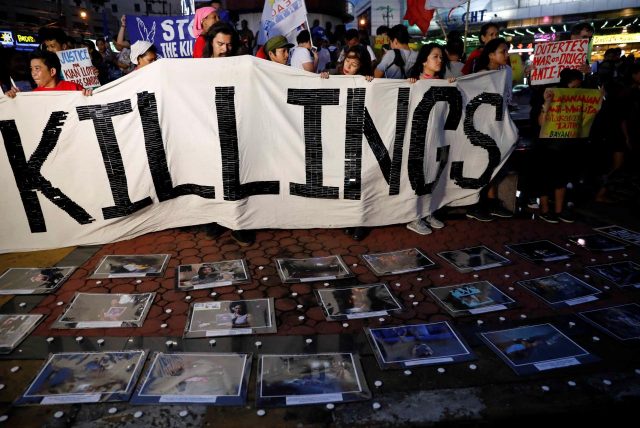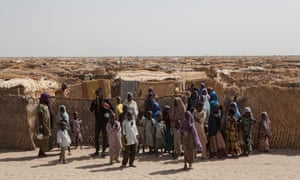 Downloads
Downloads
 Downloads
Downloads
 Downloads
Downloads

The Nigerian Coalition for the International Criminal Court will like to join Coalition for the International Criminal Court in expressing our profound sadness at the passing of Professor M. Cherif Bassiouni. “Cherif was truly one of the world’s greatest experts of international law and justice. He was a true champion of the International Criminal Court and long-time supporter of the Coalition for the International Criminal Court,” said William R. Pace, Coalition Convenor. Readmorehttp://www.coalitionfortheicc.org/news/20170926/passing-m-cherif-bassiouni-godfather-international-criminal-law
 Downloads
Downloads
After dismissing recommendations on ending extrajudicial killings, not just the thousands associated with the war on drugs but also those protecting journalists and human rights defenders, the government claimed a “big victory” in the review of its record by the United Nations Human Rights Council.

“The Philippines scored a big victory in Geneva on the 22nd of September 2017 when the United Nations Human Rights Council overwhelmingly adopted Manila’s human rights report card. Readmorehttp://www.interaksyon.com/after-ignoring-rights-recommendations-govt-claims-big-victory-in-geneva/
 Downloads
Downloads
Arrests, Enforced Disappearances, Threats Against Opponents;

Rwandan authorities have arrested, forcibly disappeared, and threatened political opponents since the August 2017 presidential elections, Human Rights Watch said today. The incumbent, Paul Kagame, won the election with a reported 98.79 percent of the vote.
Those targeted include a would-be independent presidential candidate, Diane Rwigara, and her family members and supporters, and several leaders and members of the Forces démocratiques unifiées (FDU)-Inkingi opposition party. read morehttps://www.hrw.org/news/2017/09/28/rwanda-post-election-political-crackdown
 Downloads
Downloads
Trial of Pennsylvania Resident and Alleged Liberian War Criminal Jabbateh “Jungle Jabbah” Set to Begin in Philadelphia October 2, 2017.
According to Civitas Maxima, Philadelphia, PA – The U.S. Government’s immigration fraud case against Liberian citizen, Pennsylvania resident and alleged war criminal Jabbateh, a/k/a “Jungle Jabbah” begins on October 2, 2017 in Philadelphia. Jabbateh has been charged by the U.S. Attorney’s Office for the Eastern District of Pennsylvania with two counts of fraud in immigration documents and two counts of perjury. read morehttps://www1.hnewsletter.ch/hosting/civitasmaxima/?action=view&iv=b45400be4ea4b1b7250fb4677bf9aa597fee1650d00d71aa56ba0a93311689f5&en=69a8d86f5b66741ed822db44ee
 Downloads
Downloads
Nigeria’s military has reacted heavy-handedly to the growing separatist swell in the south-east among organisations claiming to be the successors of the failed late-1960s Biafra secessionist movement. This month the military embarked on ‘Operation Python Dance’, a show of force to try to quell the Biafra agitation.
The exercise targeted the supporters of the Indigenous People of Biafra (IPOB) and its leader Nnamdi Kanu, who has been central to the Biafra agitation since 2015. Several pro-Biafrans have been arrested and the military has been accused of brutality, arbitrary killings and torture. Over 150 IPOB supporters were killed on last year’s Biafran Remembrance Day, human rights group Amnesty International reported. Read more https://issafrica.org/iss-today/nigerias-military-approach-against-separatists-stokes-more-tension
 Downloads
Downloads
In the face of mounting evidence of crimes against humanity committed with impunity by Burundian authorities, 35 African and international NGOs call on the Human Rights Council to push for investigation and prosecution by the International Criminal Court and for Burundi’s Council membership. This call was further elaborated by ISHR in a statement to the Council. A Council-mandated Commission of Inquiry, reporting at the current September session, has confirmed the continuation of serious human rights violations from April 2015 to date. Read more http://www.ishr.ch/news/burundi-crimes-warrant-icc-investigation-and-human-rights-council-suspension
 Downloads
Downloads
The Attorney General of the Federation has announce its readiness to begin the arraignment of Boko Haram suspects in various detention facilities in the country. It is slated to kick-start tentatively on Monday, October 7, 2017.
Below is the report from the office of the Attorney General;
STATUS OF TERRORISM CASES as at 11th Sept 2017
Concluded cases: 13
Convictions: 9
Ongoing trials at various Federal High Court Divisions: 33 cases
Charges filed awaiting trial in Kainji: 116 cases
Detainees recommended for release / deradicalisation programme for want of evidence: 220
Detainees profiled at the Kainji Detention Facility awaiting judicial proceedings / deradicalisation programme. 1670
Detainees remanded at the Federal High Court, Maiduguri and transferred from Giwa Barracks to Maiduguri Prisons: 651
SOME CHALLENGES
OTHER USEFUL INFORMATION
This is the report of the on-the-spot assessment of the facilities and other incidentals preparatory to the commencement of trial of the over 1600 suspected Boko Haram terrorist detained in military detention facility located in Wawa Barracks, Kainji, New Bussa, Niger State following successes recorded by the Nigeria Army and other security agencies in the fight against terrorism in Nigeria.
A team comprising representative of the Office of the National Security Adviser (ONSA), Federal High Court and the Office of the Honourable Attorney-General of the Federation were dispatched to Kainji from the 12th to 14th of September, 2017 to carry out the assessment and to discuss with relevant authorities and organisation in final preparation of the all-important national assignment.
Categorisation of the suspects
It will be noted that there are four categories of suspects at the Kainji detention facility mentioned above. These suspects are;
Boko Haram suspects who were hitherto investigated by the Joint Investigation Team set up by the Defence Headquarters otherwise known as DHQ/JIT and case files transmitted to the Honourable Attorney-General of the Federation and after a careful review of the cases based on their individual merit, it was discovered that they have no prima facie cases that will sustain a charge against them in any court of law hence were recommended for release and handed over to the Office of the National Security Adviser (ONSA) for rehabilitation and/or de-radicalisation.
The second category is the set of suspects that the Honourable Attorney-General found prima facie cases against them and charges already filed at the Federal High Court, Abuja Division who are also mostly in the detention facility under reference and may be willing to plead guilty for a lesser sentences.
The other category are the suspects whose case file are either recommended for further investigation or that have no investigation conducted on them at all hence they do not have case files that will warrant the Honourable Attorney General of the Federation to form any opinion in respect of their case.
Lastly, the fourth category is the suspects whose cases were reviewed and a prima facie were found and may be willing to opt for a full trial.
From the above categorisation, it is important to state that the number of the suspects affected by any of the aforementioned categories would only be determined when the trial has commenced.
–
Comrade Salihu Othman Isah
Special Adviser, Media and Publicity to the Honourable Attorney General of the Federation and Minister of Justice, Abubakar Malami, SAN
 Downloads
Downloads
On the 18th of September 2017, the Human Rights Council held an enhanced interactive dialogue on the situation of human rights in South Sudan.
Taking part in the dialogue were Kate Gilmore, United Nations Deputy High Commissioner for Human Rights; Yasmin Sooka, Chairperson of the Commission on Human Rights in South Sudan; Paulino Wanawilla Unango, Minister of Justice and Constitutional Affairs of South Sudan; Augustino Njorge, Deputy Chairperson of the Joint Monitoring and Evaluation Commission for the Agreement on the Resolution of the Conflict in South Sudan; Eugene Nindorera, Director of Human Rights of the United Nations Mission in South Sudan; and Khabele Matlosa, Director of the Department of Political Affairs of the African Union Commission. In her statement, Kate Gilmore, United Nations Deputy High Commissioner for Human Rights, noted that the scale of human suffering generated by the crisis in South Sudan was almost beyond description. Readmore
 Downloads
Downloads
On the 20th of September 2017, the United Nations Organization entered a revolutionary agreement with the Civilian Joint Task Force that will end the use of children in the conflict against Boko Haram in north-east of Nigeria.
The Civilian Joint Task Force (CJTF) was formed largely from vigilante groups in response to the Boko Haram insurgency. The force protects communities in areas poorly guarded by the military, but has been accused of rape and human rights abuses by Human Rights Watch and other rights organizations.
Minors have been recruited by Boko Haram since its inception in 2013, often for search operations, to guard outposts and to perform night patrols.
According to the UN, between October 2015 and August 2017, more than 360 children were used by the 23,000-strong armed task force, some as young as nine. Since the insurgency began in Nigeria in 2009, more than 8,000 children have been recruited by Boko Haram, with children – especially young girls – increasingly used as suicide bombers.
The report also found that attacks by Boko Haram on communities and security forces had resulted in the deaths of more than 3,900 children. A further 7,300 have been injured.
In the same period, suicide attacks became the second leading cause of child casualties, accounting for more than 1,000 deaths and 2,100 injuries.
The concord, reached after a year of negotiations led by the UN, will draw a line under the enlistment of children by the group.
Mohamed Fall, a UNICEF representative in Nigeria, said: “We have seen too many childhoods destroyed by the crisis in the north-east. Today’s agreement is an important milestone for child protection and paves the way for a brighter future for children caught up in the conflict.”
Under an action plan, implemented as part of the agreement with the Borno state government and Nigerian state authorities, children will receive psycho-social support and undertake community reintegration programmes, and attempts will be made to reunite them with their families.

Jibrin Gunda, the legal adviser for the CJTF, said the agreement was a vital step. “We’ve already started to carry out the action plan we signed with the UN,” he said. “Anyone under the age of 18 will no longer be a part of the CJTF. We are doing our best to make sure we are on the right side of human rights codes.”
The special representative of the secretary-general for children and armed conflict, Virginia Gamba, said the deal was a source of hope for children affected by the fighting. And added that now that the action plan has been signed, he urge the CJTF to fully implement it in order to end and prevent the recruitment and use of children once and for all.”
 Downloads
Downloads
Another witness, Mr. Agbo Utah, told the panel that soldiers watched as herdsmen burnt down his compound. He also narrated how he was beaten, arrested and detained for a week by soldiers who disrupted local government election held in the area in 1998. Demands Aside the narratives, the displaced communities prayed the panel to order immediate restoration of their ancestral lands with adequate compensation. They further want all places of worship, schools and markets that were destroyed as a result of the attacks by soldiers of the 93 Battalion, Nigerian Army, Takum, Taraba State, and herdsmen, be rebuilt on their original sites.
Shortly after Justice Georgewill, Chairman of the seven-man panel, declared the sitting open, victims who were residents of Moon Valley communities in Kwande Local Government Area of Benue State took turns to narrate their experience. They narrated how about 30,000 persons were displaced by the military from their abode. Represented by their lawyer, Mr. Mike Utsaha, the community told the panel that while 28 persons were killed in the attack, 91 compounds and property were destroyed.